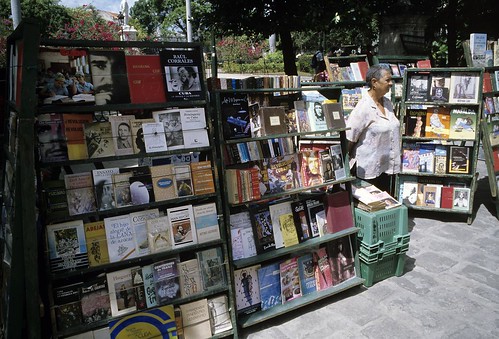
From an email in which I try to explain my reservations about e-book devices like the Amazon Kindle.
If these devices propagate information more thoroughly, that would be terrific. But the way they are being packaged is as a business plan for keeping newspapers and publishing houses solvent against the onslaught of digital media - i.e. an e-savior for businesses whose primary product has not been electronic. And I think the message that this will increase ready access to the written word for people who may not have it now is part of a marketing strategy to alleviate guilt in a group of people who both have strong convictions in the necessity of language & literature and a strong social conscience, and who also just so happen to be the target market for this device. Unless Amazon can alleviate the guilt, they won't be able to sell these people a Kindle.
A seduction, in other words. Like the Product Red program that "allows" people to buy highly discretionary items under the cover of making a (minuscule) donation to Africa. Absolution has become a major marketing tool in this era. In many ways, it is almost like the selling of indulgences by the church during the time of Erasmus.
Long way around, but what I think is this: don't by a red sweat shirt - send the entire purchase price to Africa and do without the sweat shirt entirely. Or set yourself an hourly rate where if you spend $100 on discretionary items, you then need to work in community service for 5 hours at an imagined $20/hour.
The language associated with e-books is the same language associated with computers 20 years ago, and yet there still isn't the democratic device in terms of computers. The OLPC is trying, but it faces many obstacles, the most complicated to solve being that the many people who would be its beneficiaries would benefit more highly from things like food, clean water and medicine.
As members of the first world, we, like Donald Rumsfeld, have a strong belief that technology is the answer to many of our issues. But as the AK-47 proves over and over again, sometimes technology pales in comparison to good old analog steel. Sometimes a book is just better. Longevity, durability, transportability, universality, etc. To read an e-book, you need electricity and an e-book reader compatible with that e-book's file system. To read a book, all you need is a little light.
If some sort of pay-to-play were worked out - Amazon and its brethren must provide unlimited access for public schools to every e-book produced in order to use the public airwaves to transmit its content to all the Kindles running through the NYC subway - I might feel more comfortable about it. Of course, they'd have to promise to keep all the e-book reader interfaces up and running. I know from many friends in academics that while school systems have little problem getting computers, maintenance is a whole other ball of wax. Lots of broken computers sitting in back closets waiting repair due to lack of funds or languishing unused due to obsolescence.
The reality is that the people who benefit most highly from e-books are the book manufacturers and Amazon. Warehousing and shipping books (along with the employees required to manage this process) must be a tremendous expense that not even just-in-time warehousing/publishing can offset sufficiently. E-books would create the possibility for greater control over profits for those entities, whether or not they would actually benefit the consumer. So all the rhetoric around e-books is suspect until the benefits to consumers can be shown to at least equal the desire of the producers to cut their overhead by eliminating warehousing, reducing employees, and cutting brick & mortar retailers out of the income stream.
Finally, because I like words and deal in their nuances, I can't ignore that while the word "kindle" can connote germination of an idea, it also means starting a small fire for the purposes of burning something larger and more resistant to flames. And that sense of the word is a bit too close to my flammable library.
I like technology and gadgets as much (or perhaps more) than the next guy. I am much more of a fan of the book publishing robot that the NY Public Library recently obtained. In 20 minutes, it can publish a book from an electronic file, allowing the library to dispense far more books in physical form that it could ever stack on its shelves. A physical book that can be read by anyone without the necessity of batteries or a device.

I was sitting in a gallery yesterday while listening to a docent explain to a kaleidoscope of high school students that a photo of a white person and a black person that hung on the wall before them required the photographer to compensate for exposure based on the meter's reading of the light so that the black person's skin would not be too dark and that this made the photograph more complicated. And it occurred to me that even light meters were calibrated to one thing in order to measure another and that right now somewhere in Washington DC there is a room full of photographers fidgeting with their cameras as one of them steps forward to the empty podium with a meter in their hand. They call out the reading, and each photographer does their silent calculations for exposure, turning a knob, twisting a dial and compensating.

This issue has been rattling around in my head a bit lately. I think it has always been there. People have told me that I tend to over-complicate situations through an excess of empathy. And I worry that sometimes I border on unfairly paternalistic in my concern about the impact of my presence on other people. I try to recognize that everyone has their own lives that they live as best they can and from that they generate a sense of pride and accomplishment that is wholly and 100% their own. And that this self-possession is something that I can not diminish with something as insignificant as my appearance on a street corner in their neighborhood.
But I have been struck over the last several years while traveling by the relative materialism of tourists from the developed world, especially while they are visiting third world or less developed destinations. They arrive in sparkling new clothes, with lovely new backpacks carrying one or two new cameras, maybe a laptop, cell phones, pdas, chargers, batteries, and so forth, in countries where the average salary per year is less than the contents of said backpack. Perhaps even less than the cost of the backpack itself.
The places these tourists (and I include myself in this category of tourist) visit are more than happy to see us. We bring money to areas that desperately need money, provide jobs, development, infrastructure, that would otherwise not be there.
But you do not have to dig too deeply to feel that along with this welcome is a thin layer of resentment (is that the right word? discomfort at least) created by the ostentatiousness of these accessories carried by tourists from developed countries, who, in turn, barely recognize these items as anything other than the standard equipment of travel.
So there is the welcome extended and your visit graciously received for its benefit, but along with that comes a sour bite from the economic chasm between you and the people you meet as you travel.
I am not sure if I am making sense. Friends have said that I am just feeling guilty for where and into what circumstances I was born. And that potentially I am transposing that sense of guilt onto people who are independent and proud of who they are, their country and their lives. That I am being paternalistic, perhaps even colonial.
But I have had opportunities to talk to people in the countries I have visited, and I have heard them suggest that the feelings are just as complex on their end of things. Like I said, they see the benefit to having tourists come and visit, economically and politically. But they also see the incredible materialism exhibited by these tourists, and they wonder why just a fraction of that wealth expressed by giant digital cameras, laptops, cell phones, jewelry, could not instead be invested in their countries where it might make the difference for some people, not just between happiness and sadness, but between life and death.
You cannot imagine how much you stick out like a sore thumb in a third world market place. There isn't one thing about you that isn't entirely foreign in appearance. If you were dressed in dayglo orange you wouldn't be any more apparent to the people who live there.
When I worked in outdoor equipment retailing, we had some t-shirts that said something like "Leave only footprints, take only photographs." A friend of mine said he thought that in some places even footprints were too destructive. I think he used the White Mountains as an example of a place that gets so many footprints, everything is getting a bit worn away. The landscape is being changed just by the footprints left behind.
At any rate, footprints are inevitable if you go places. What I have been thinking about lately is the kind of footprints you leave. Or the depth of them. And I think this expression of materialism that is made by all the things we carry with us when we travel is a sort of footprint, a deep one that could perhaps be made a bit shallower without diminishing the experience of travel or our ability to remember what experience was had.
I don't know. I definitely have come to think less is more when it comes to travel. I have tried to reduce what I bring to what I need and not what I might need. I resolved to stop looking for the perfect camera bag and just use what I have until it falls apart. My experience on a trip is not going to be adversely affected by whether or not I can get email. Or make a phone call from a mountain top. Fill a frame with a lion's head and post on Flickr that very night. Reduce reduce reduce.
Above all, my goal is respect. If you have clothes made of gold, you don't wear them to visit your friend who has clothes made of rags. At the same time, you don't wear clothes made of rags when that is not what you wear regularly. What begins as respect can become an insult if taken too far.
And I don't expect everyone to share my concerns. Travel as you will. Just that this is something that I have been thinking about - before during and after travels - and I guess in a way I haven't really come up with a suitable answer for myself.


